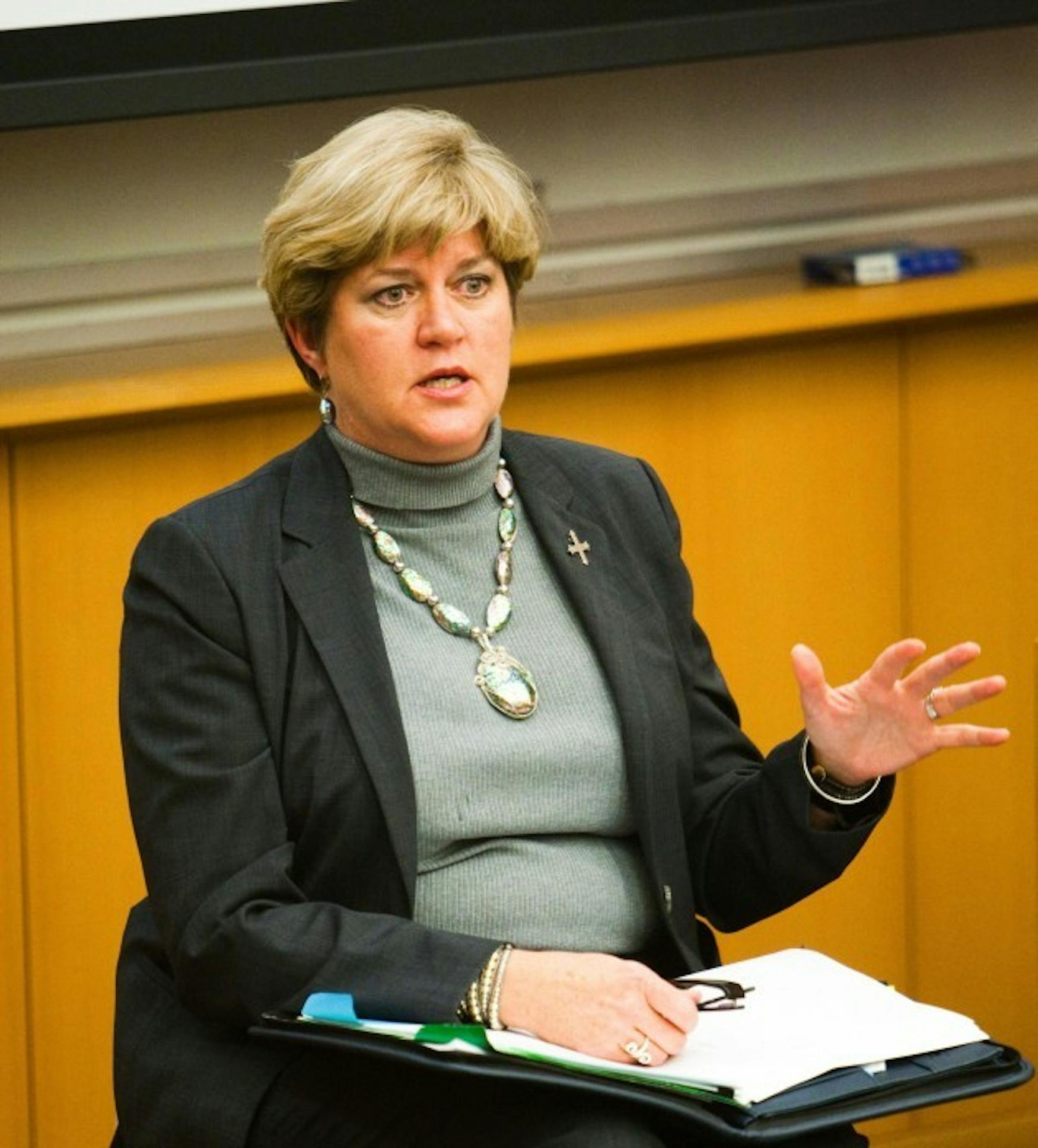Watkins reflects on her role in Enron collapse
Former Enron Corporation Vice President and whistle-blower to the company's 2001 financial fraud Sherron Watkins gave a lecture about her experience as a whistle-blower and its impact on her life last Wednesday. The event also featured a discussion with Alison Bass (AMST), a lecturer in journalism, during which they discussed the relationship between whistle-blowing and the media.
The event, which took place in the Mandel Center for the Humanities, was presented by the Journalism program and the International Business School and co-sponsored by the American Studies program, the Office of the Dean of Arts and Sciences and the Schuster Institute for Investigative Journalism.
Watkins' role as a whistle-blower for Enron, an American energy and services trading company, began in August 2001, when she wrote then-CEO Ken Lay an anonymous memo alerting him to the company's accounting irregularities. She met with Lay later that month and expressed her concerns; he responded by assigning the company's law firm to look into the situation and whether or not Watkins could be fired without legal trouble. In September, Lay informed the company that all was well, but on Oct. 16, Enron reported quite the opposite for the third quarter—including a loss of more than $600 million. This was linked to the information Watkins had previously detected and exposed, which led to her identification as a whistle-blower.
Watkins used the tale of the Emperor's New Clothes as an analogy to describe the Enron's demise. She compared the tale's emperor to Lay and equated his disregard of his kingdom and attention to his clothes to Lay's focus on the price of the company's stock rather than its overall goals.
Watkins said that even higher-ups had difficulty speaking up regarding the company's financial situation. "We hired the sharpest accountants, the sharpest bankers. Arthur Andersen is the most well respected accounting firm, [so if] they've signed off on [documents], … even our board of directors was intimidated into saying, ‘What brilliance!'"
Up until late 2001, the company had been incredibly successful, doubling its stock price every three years in what Watkins described as a "phenomenal performance."
Enron had been "well regarded throughout the media empire and the business financial press, in business schools and, of course, on Wall Street" prior to the scandal, Watkins said. However, the company crumbled quickly; less than two months after Watkins met with Lay, Enron filed for bankruptcy on Dec. 2, 2001.
This quick downturn also turned out to be her saving grace. "Enron imploded too fast to actually fire me," she said, referring to the consequences she might have faced for whistle-blowing.
Dana Gold, director of the American Whistleblower Tour: Essential Voices for Accountability, through which Watkins was brought to campus, moderated the discussion and provided a legal perspective on the issue. She explained that a whistle-blower is a "current employee of a company who discloses concerns in a reasonably believed evidence of, [for example,] a violation of laws."
Gold noted that Watkins' fate is one that is unique to most whistle-blowers. Watkins admitted that she has heard from many people who "did something like what I did and their lives have been wrecked … in every single, solitary way. … Because they spoke truth to power and the emperor crushed them, crushed them like a bug."
At the time she approached Lay, Watkins believed the company could still be resurrected. "I felt as if this was very significant fraud, that a company rarely recovers from cooking the books to this magnitude, [but] if they are going to recover, they needed to come clean on their own." But throughout fall 2001, she noted that "no one took [her] concerns seriously."
Turning the discussion toward the relationship between whistle-blowers and journalists, Gold cited the issue of the Pentagon Papers in 1977, which she claimed is a "great example of the important relationship between whistle-blowers and … the media, or journalism, as a vehicle to get that information out."
Watkins acknowledged that she is "often criticized" for not bringing her story to the press, but defends herself by asking her audience, "Please show me evidence where someone reported financial fraud and a financial journalist listened."
Bass recognized Watkins' point and agreed that "it's tough when somebody calls you up, out of the blue [as a sort of whistle-blower]. … You don't know what their motivations are. … Just like it takes individuals who will speak truth to power, it also takes journalists who are willing to challenge authority and speak truth to power."
Leigh Nusbaum '11 attended the lecture and was impressed by Watkins' approach to the situation. "It seems like it's so easy [to just speak the truth]," she said in an interview with the Justice. "But when you hear about the pitfalls … that other people have gone through [as a result], it really shows how courageous people like Watkins are to blow the whistle on fraudulent corporate practices."
Daniel Werl '15 agreed, and said that he did not realize how serious the repercussions of whistle-blowing could be. "It's interesting to hear that these stories have terrible consequences for standing up for what's right and end up going so wrong," he said in an interview with the Justice.
Watkins made it clear that blowing the whistle on such an immense issue is something from which she has yet to fully recover. "It's ancient history to you guys," she told the audience, but "it feels like a recent current event to me."



Please note All comments are eligible for publication in The Justice.